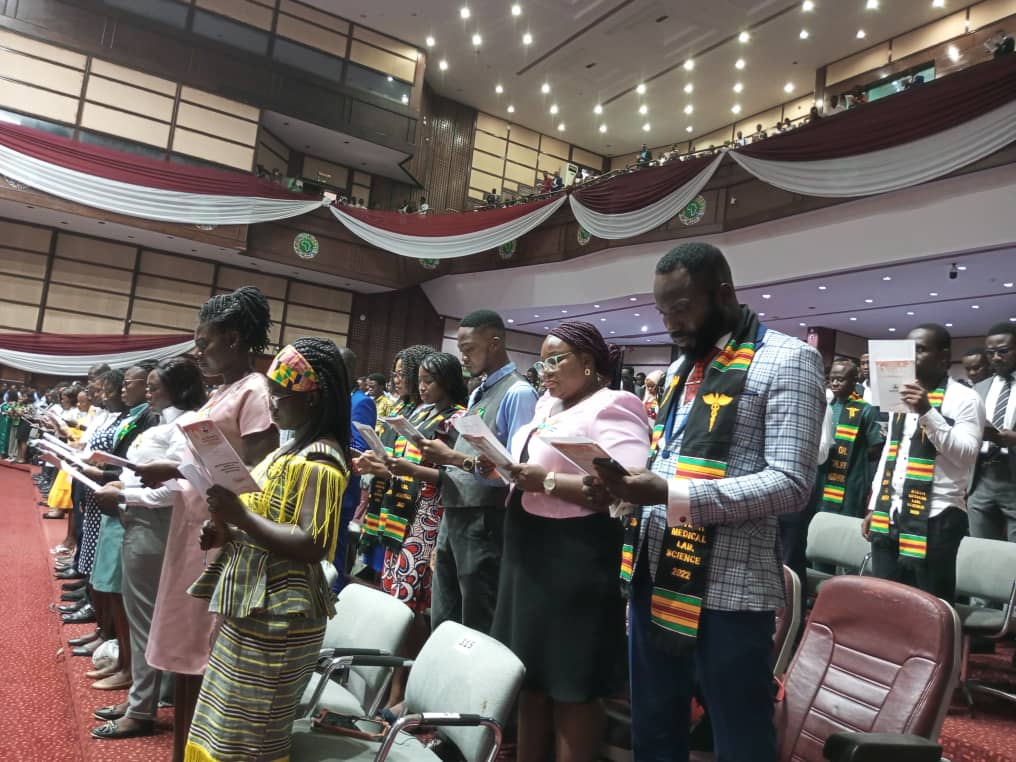By Iddi Yire
Accra, Nov 29, GNA – Mr Samuel Yaw Opoku, Registrar, Allied Health Professions Council, has urged allied health professionals to limit the use of industrial strike and picketing as a means to getting their grievances resolved.
He advised them to be guided by true sense of brotherliness, sense of nationhood and help build mother Ghana to the state that Ghanaians could all be very proud of.
Mr Opoku gave the advice in his address at the Induction and Oath Swearing Ceremony for newly qualified Allied Health Graduates in Accra on the theme: “Improving Access to Quality Healthcare: The Role in of the Allied Health Professionals.”
Allied Health Professionals are health care practitioners distinct from optometry, dentistry, nursing, medicine, clinical psychology, and pharmacy.
They provide a range of diagnostic, technical, therapeutic, and support services in connection with healthcare.
Mr Opoku noted that the Induction and Oath Swearing Ceremony presented a solemn but joyous occasion for their graduating Allied Health Interns to swear their Professional Oath and thus, become properly inducted into the health profession to undergo the mandatory internship and to sign a social contract with the Ghanaian population as required by Section 10 of the Health Professionals Bodies Act, 2013 (Act 857).
The Registrar reiterated that he was confident that the Ministry of Health would continue to give serious considerations to some critical issues facing the Allied Health Professions.
He underscored the urgent need to establish an Allied Health College to provide the opportunity to individuals to develop themselves professionally and specialize in various disciplines to enable them to offer the needed healthcare to the population.
He also reiterated the urgent need for the Ministry of Health to support the Council in its quest to phase out some four-year bachelor programmes to be replaced with six-year professional doctorates.
He said it was significant to note that the Government through the Ministry of Health had approved these programmes developed by the West Africa Health Organisation.
He said the introduction of two of the programmes, namely, Doctor of Optometry and Doctor of Medical Laboratory Sciences had been confronted with several challenges.
“It is our hope and prayer, that the Ministry will give equal recognition and support it has given to similar programmes.”
He said another disturbing issue facing the Allied Health Industry was the canker of quacks, who had invaded the health delivery system, adding that the harm being committed by these people could not be underestimated.
Mr Opoku said the Council with the total support of the Governing Board and the Health Intelligence Unit of the Ministry of Health had been trying to weed out the charlatans from the society.
He said that unfortunately the expected support from the law enforcement agencies had not helped much to deal with the situation, adding that several cases reported to the Police across the country appear dead for lack of prosecution.
“Our humble appeal is for the necessary support in this fight by swiftly dealing with the offenders to protect the unsuspecting members of society from these criminals,” Mr Opoku said.
“I also appeal to the public to immediately report to the Council any suspicious activities of people who pose as allied health professionals for the necessary action to be taken.”
Professor Augustine Kyere, Board Chairman, Allied Health Professions Council, who chaired the function, reminded the inductees that the oath that they had sworn was supposed to be a covenant between them and the Council and that they should be prepared to face the consequences when they breach it.
He said the next task for the inductees was a year of internship in their respective areas of specialisation and that they needed to develop strong interpersonal skills and to network.
Prof Kyere further appealed to the inductees to be good ambassadors of the Council.
The Allied Health Professions Council is the body established by an Act of Parliament (Act 857, 2013) to regulate the training and practice of Allied Health Professions in Ghana.
As part of its mandate, the Council is responsible for granting Professional Accreditation for all Allied Health Programmes.
The Council is responsible for ensuring the highest standard in the practice of allied health profession in Ghana.

GNA